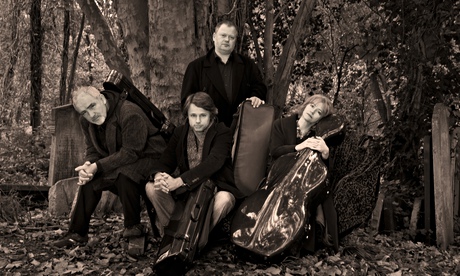
Shostakovich's string quartets have long been a cornerstone of the Brodksy Quartet's repertoire, but the Royal West of England Academy's exhibition Shock and Awe, a reflection on conflict, provided an unusually potent setting. Playing in the shadow of Tim Shaw RA's towering sculpture, Casting a Dark Democracy, even the benign Quartet No 1 in C major carried a tremor of foreboding, the inflections for once suggesting less the heritage of Borodin than the battles of Borodino. The muted string sound of the scherzo had a quiet menace, the hurtling finale a sinister energy.
This was the first in a series of five concerts taking place in the World Changed programme, a year-long examination of the first world war in venues across Bristol. Audience and players had a sense of embarking on a long journey together. It was in the recitative of the opening movement of the second quartet in A major, with the impassioned voice of first violin, Daniel Rowland, that the dramatic impact of Shostakovich hit with unexpected force. Rowland's is a highly physical presence, seemingly galvanising the responses of his fellow quartet-members so that the music was expressed with startling immediacy.
With the Quartet No 3 in F major came the greatest awareness of the composer's deeply personal engagement with the quartet medium, a direct parallel with Beethoven's quartet cycle. There was a visceral sense of Shostakovich's tussling with moral and philosophical questions, and, in this artistic context, their contemporary dimension could not fail to add a sobering element to the performance. The Brodsky's ability to communicate on so many levels – humanity and virtuosity all part of the essential integrity of their approach – promises to make this a memorable cycle.
• At the Lord Mayor's Chapel, Bristol (0845 4024001) on 17 October.

